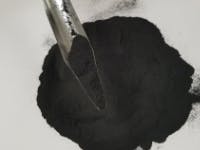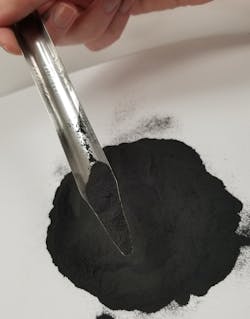"We're extremely excited about this lignin," said Arunas Chesonis, Chairman and CEO of Sweetwater Energy. "We knew the lignin we were producing was ultra-pure, but when we started investigating its use for activated carbon a year ago, we did not know it would produce such a radically enhanced carbon."
Sweetwater's newest employee, Vipin Kuckreja, has worked in the activated carbon business for over 40 years with leading activated carbon companies such as Calgon Carbon and Cabot/Norit. Vipin joined Sweetwater to develop the new lignin-based activated carbon markets. "Sweetwater Energy has performed extensive studies and is planning to bring activated carbons to the market that have a unique pore structure created by processing an abundantly available raw material, wood, via its proprietary biomass conversion technology, to obtain high purity lignin," said Kuckreja.
Kuckreja detailed one of the independent studies that brought the new lignin's attributes to light. Activated carbon derived from Sweetwater's lignin was compared in adsorption per unit weight of carbon to three bituminous coal-based activated carbons made by a leading U.S. manufacturer; coconut shell-based activated carbon; and a wood-based activated carbon, in six different types of applications -- regenerable heavy loading, heavy loading, moderate loading, regenerable trace loading, trace loading, and ultra-trace loading. In a matrix of 36 results, Sweetwater's lignin-based activated carbon outperformed the others by a significant margin in 34 of the 36 tests.
Sweetwater describes the key points of its process:
- Particle size of lignin is reduced to an average of 19 microns, creating high surface area and ideal pore structures for activation
- Lignin is not degraded as it is separated from the cellulose and hemicellulose.
- The process solubilizes 94% of the hemicellulose and cellulose fractions of hardwood, leaving a lignin that is non-sulfonated, has low carbohydrate content, and can be easily charred and simply steam activated.
- Sweetwater's technology is scalable. Sweetwater is commercializing the technology first utilizing hardwood. Sweetwater systems can be deployed using many feed stocks, across the world, to create lignin for high-end powdered activated carbons (PAC) production.
"We've seen a tremendous reception in the activated carbon industry," said Chesonis. "The performance of our lignin-derived activated carbon has created a unique opportunity. The challenge I've placed before my team is to now create a wide variety of high-performing activated carbon products from some of the other forty feedstocks we have tested from around the globe."
For further information/detailed discussions, please visit www.sweetwater.us or contact Sweetwater Energy:
Vipin Kuckreja, GM Activated Carbon
[email protected]
Lauren Eichelberger, BD Manager
[email protected]
(585) 794-5207
SOURCE: Sweetwater Energy




